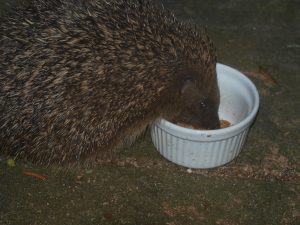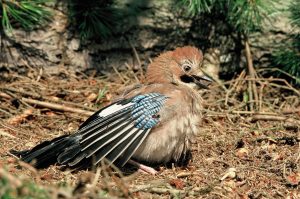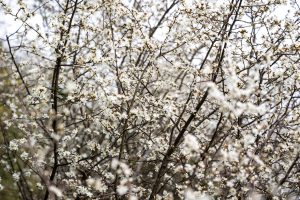How to Prepare Your Garden for Hedgehog Hibernation
Hedgehogs love gardens – especially when it comes to finding a spot to hibernate. But with the decline of hedgehogs in the UK in recent years, it’s important to make sure you’re doing all you can to keep them safe.
Have you ever asked yourself the question – ‘why is hedgehog hibernation dangerous?’ If not, it’s a question worth asking. It’s easy to miss these cute little creatures in your garden. But there are things you can do to help them – particularly in the run up to hibernating season (October/November).
With input from the BHPS, here are some tips on how to prepare your garden for hedgehog hibernation.
If you think that hedgehogs may be visiting your garden, it’s always a good idea to leave some food and water for them. This food and water could well be a lifesaver, especially in colder months when natural food is in short supply.
So, what should you feed hedgehogs?
Please don’t leave bread and leave milk out for them – their stomachs aren’t made for digesting either. In fact, they’re lactose intolerant so milk can upset their stomach and make them very unwell.
The best food to leave out for hedgehogs, other than hedgehog food, is cat/kitten biscuits or tinned puppy/kitten food – but only use meat flavours, never fish. Water is the best drink to offer.
If you have any cooked unprocessed meat leftover, you can also leave this out for them. Be sure to cut it into tiny pieces as hedgehogs have little teeth and aren’t able to effectively chew larger pieces, and remove any bones.
What should you look out for in your garden?
When it comes to pesticides and slug pellets, we would advise that you avoid them completely. These are poisonous for hedgehogs if they eat them and can make them incredibly unwell. And it’s not just the pellets – hedgehogs are likely to eat poisoned slugs and snails too, which can also be dangerous for them.
Wherever possible, it’s always advisable to remove dead slugs. This means hedgehogs can’t eat them and get poorly. A great alternative to slug pellets is a bowl of stale beer, sunk in the ground.
If you are going to use garden pesticides and are aware of hedgehogs in the area, please use them sparingly and use under a low slab or similar to reduce chances of non-target species getting poisoned. It’s always worth trying alternative methods before reaching for the pesticides. They’re better for your garden and hedgehogs too – so everyone’s a winner.
For example, sprinkling coffee grounds around the base of your plants helps to act like a barrier method without affecting hedgehogs. You could also try placing copper bands around the base too.
But it’s not just pesticides that endanger hedgehogs… you should also take care when cutting your grass. If it’s particularly long, you may find that a hedgehog family set up camp in the grass – so the last thing you want to do is mow the lawn or strim the edges without checking first.
If you’ve a compost heap or are planning a bonfire around November, please take care. Many hedgehogs start to go into hibernation around October/November so if you’ve built your bonfire days before you intend to burn it, you may find that a hedgehog has used it as a nest to hibernate in.
You should always check your bonfire before lighting it and, if possible, build or re-site on the day it is to be lit. When lighting, light from one side only so that there is an escape route should you have missed anything when you checked. Similarly, with your compost heap, make sure you check it before you do anything with it.
And don’t forget about litter…
This can be incredibly hazardous to hedgehogs – particularly plastic 4-pack and 6-pack rings from drink cans. If you see these anywhere, pick them up to make sure the hedgehogs can’t get caught in them or injured. When disposing of them, try to make sure you cut each circle.
You should also check for any obvious litter too. Chances are you’ll keep your garden neat and tidy anyway but sometimes others may drop rubbish. Perhaps your postman drops the occasional elastic band. Whatever it may be, try and pick it up as soon as you spot it.
What else can you do?
If you want to make sure any hedgehogs in your garden are kept safe throughout hibernation, you can either build them a little hedgehog house or buy one. This will protect them from natural predators and give them a safe place to make a home.
Have you ever asked yourself the question – ‘why is hedgehog hibernation dangerous?’ If not, it’s a question worth asking. It’s easy to miss these cute little creatures in your garden. But there are things you can do to help them – particularly in the run up to hibernating season (October/November).
With input from the BHPS, here are some tips on how to prepare your garden for hedgehog hibernation.
If you think that hedgehogs may be visiting your garden, it’s always a good idea to leave some food and water for them. This food and water could well be a lifesaver, especially in colder months when natural food is in short supply.
So, what should you feed hedgehogs?
Please don’t leave bread and leave milk out for them – their stomachs aren’t made for digesting either. In fact, they’re lactose intolerant so milk can upset their stomach and make them very unwell.
The best food to leave out for hedgehogs, other than hedgehog food, is cat/kitten biscuits or tinned puppy/kitten food – but only use meat flavours, never fish. Water is the best drink to offer.
If you have any cooked unprocessed meat leftover, you can also leave this out for them. Be sure to cut it into tiny pieces as hedgehogs have little teeth and aren’t able to effectively chew larger pieces, and remove any bones.
What should you look out for in your garden?
When it comes to pesticides and slug pellets, we would advise that you avoid them completely. These are poisonous for hedgehogs if they eat them and can make them incredibly unwell. And it’s not just the pellets – hedgehogs are likely to eat poisoned slugs and snails too, which can also be dangerous for them.
Wherever possible, it’s always advisable to remove dead slugs. This means hedgehogs can’t eat them and get poorly. A great alternative to slug pellets is a bowl of stale beer, sunk in the ground.
If you are going to use garden pesticides and are aware of hedgehogs in the area, please use them sparingly and use under a low slab or similar to reduce chances of non-target species getting poisoned. It’s always worth trying alternative methods before reaching for the pesticides. They’re better for your garden and hedgehogs too – so everyone’s a winner.
For example, sprinkling coffee grounds around the base of your plants helps to act like a barrier method without affecting hedgehogs. You could also try placing copper bands around the base too.
But it’s not just pesticides that endanger hedgehogs… you should also take care when cutting your grass. If it’s particularly long, you may find that a hedgehog family set up camp in the grass – so the last thing you want to do is mow the lawn or strim the edges without checking first.
If you’ve a compost heap or are planning a bonfire around November, please take care. Many hedgehogs start to go into hibernation around October/November so if you’ve built your bonfire days before you intend to burn it, you may find that a hedgehog has used it as a nest to hibernate in.
You should always check your bonfire before lighting it and, if possible, build or re-site on the day it is to be lit. When lighting, light from one side only so that there is an escape route should you have missed anything when you checked. Similarly, with your compost heap, make sure you check it before you do anything with it.
And don’t forget about litter…
This can be incredibly hazardous to hedgehogs – particularly plastic 4-pack and 6-pack rings from drink cans. If you see these anywhere, pick them up to make sure the hedgehogs can’t get caught in them or injured. When disposing of them, try to make sure you cut each circle.
You should also check for any obvious litter too. Chances are you’ll keep your garden neat and tidy anyway but sometimes others may drop rubbish. Perhaps your postman drops the occasional elastic band. Whatever it may be, try and pick it up as soon as you spot it.
What else can you do?
If you want to make sure any hedgehogs in your garden are kept safe throughout hibernation, you can either build them a little hedgehog house or buy one. This will protect them from natural predators and give them a safe place to make a home.



